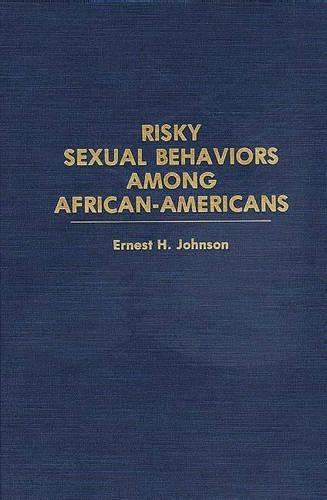
Risky Sexual Behaviors Among African-Americans
(Hardback)
Publishing Details
Risky Sexual Behaviors Among African-Americans
By (Author) Ernest J. Johnson
Bloomsbury Publishing PLC
Praeger Publishers Inc
28th February 1993
United States
Classifications
Tertiary Education
Non Fiction
Birth control, contraception, family planning
Medicine:HIV/AIDS, retroviral diseases
Ethnic studies / Ethnicity
613.9
Physical Properties
Hardback
192
Description
The major purpose of this book is to examine the interrelationships among knowledge about the transmission of HIV/AIDS, condom use, drug use, history of sexually transmitted diseases, and other relevant factors that affect African-American males and females who engage in risky sexual behaviors. Another aim is to describe how these factors are differentially related to gender and the perceived susceptibility of being exposed to the AIDS virus and testing positive for AIDS. Data has been gathered from a young adult sample of African-American males and females. Information is presented in a readily accessible manner so the reader can understand the variability of risky sexual behaviors. The author offers factual information to draw conclusions that can be used to develop HIV/AIDS prevention programs specifically tailored for the African-American community. The first chapter provides an introduction, rationale, and overview of the study. Basic information about the prevalence of AIDS among various African-American populations are presented. Then, Johnson describes information about the subjects, measures of sexual behaviors, drug use, attitudes about the use of condoms, knowledge about AIDS, and perceived susceptibility of being exposed to HIV/AIDS. Next, Johnson describes the sexual attitudes and behaviors of African-American males and females who are currently involved with multiple partners and those who have been previously treated for sexually transmitted diseases. He then describes the characteristics of African-Americans with HIV/AIDS. The epilogue summarizes the major findings and presents suggestions for AIDS prevention activities for African-American young adults.
Reviews
As Johnson considered each aspect of the study, he provided a detailed review of related literature and discussed the ways in which the findings supported or refuted previous studies. A significant finding of this study is that knowledge of HIV/AIDS did little to influence the sex behavior of those studied. Appropriate for researchers, professional educators, or graduate students.-Choice, October 1993
"As Johnson considered each aspect of the study, he provided a detailed review of related literature and discussed the ways in which the findings supported or refuted previous studies. A significant finding of this study is that knowledge of HIV/AIDS did little to influence the sex behavior of those studied. Appropriate for researchers, professional educators, or graduate students."-Choice, October 1993
Author Bio
ERNEST H. JOHNSON is Associate Professor of Family Medicine and Director of Behavioral Medicine Research at Morehouse School of Medicine in Atlanta. He is the founder and editor-in-chief of Ethnic Perspectives on Health and Behavior, a Praeger series. Dr. Johnson is the author of The Deadly Emotions: Anger, Hostility, and Aggression in Health and Emotional Well-Being (Praeger, 1990) and a co-editor of Personality, Elevated Blood Pressure, and Essential Hypertension (1990). Recently, he started Body and Spirit--The African American's Guide to Optimal Health, a quarterly health news journal for the general public. Dr. Johnson has published various articles in professional journals and books on the health problems of African-Americans.
